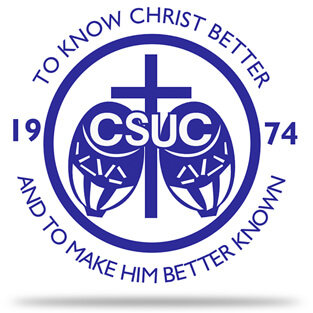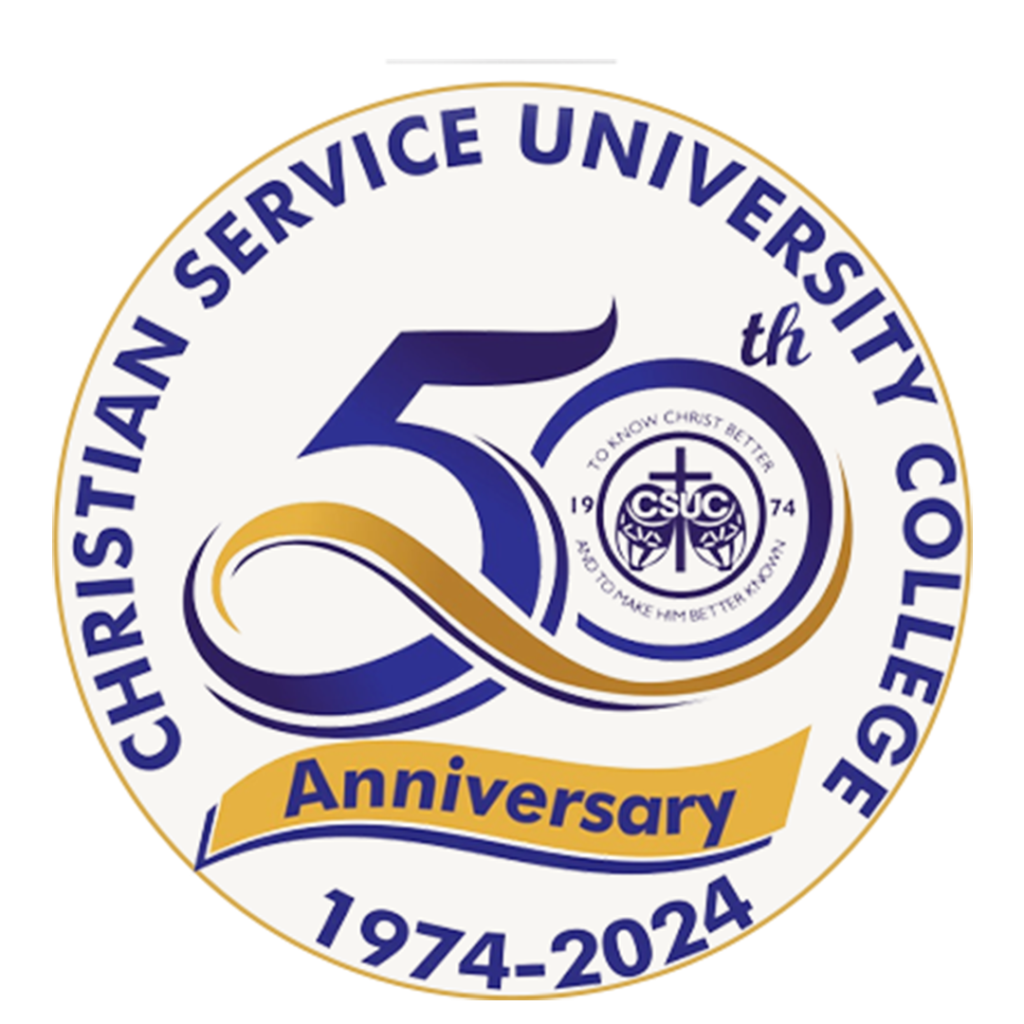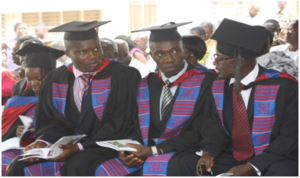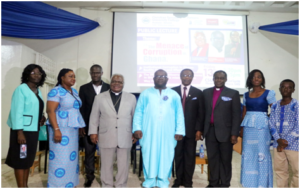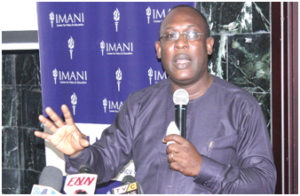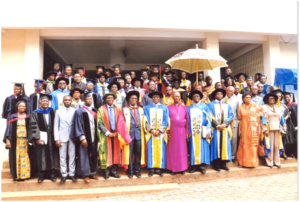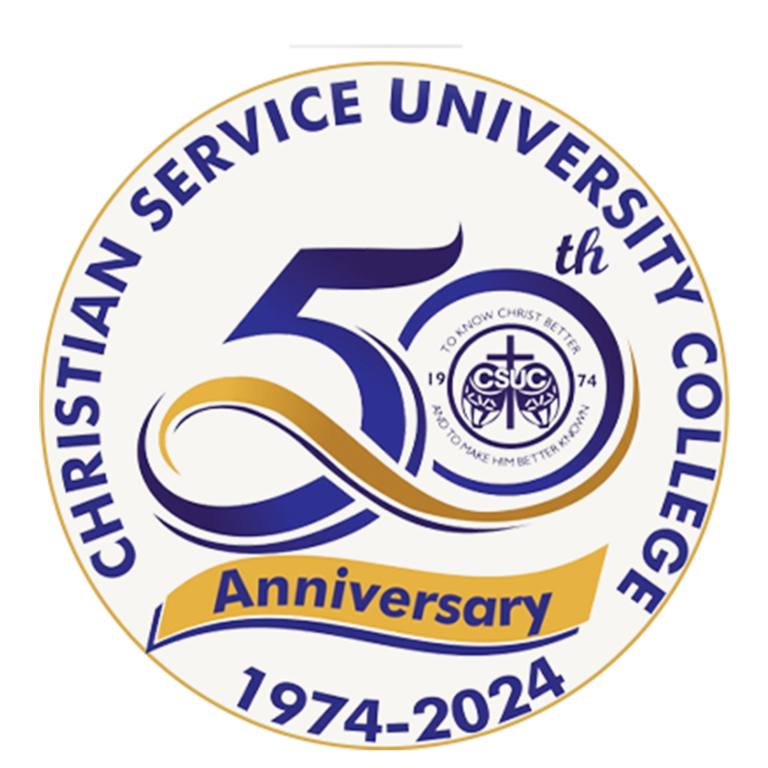Newsletter 2017/2018
Inside
- CSUC introduces Faculty of Education
- Scholarships at CSUC: 1/2 Scholarship for aggregate 6-15, Student’s Aid Scheme
- School of graduate studies-CSUC
- ICM Lauds Christian Service for impressive first time performance
- Public Lecture on corruption
- CSUC counseling Unit
- 41st Congregation
- CSUC E-Learning
- CSUC Entrepreneurship programmes
CSUC introduces Faculty of Education
The pre-requisites of numerous educational reforms in Ghana, especially since the 1980’s have led to the proliferation of educational institutions at the pre-tertiary levels of the country.
Unfortunately, the public universities in Ghana are currently unable to turn out, on an annual basis, an adequate number of professional teachers to meet the intended target of having “one professional teacher in every Ghanaian classroom.”
Consequently, there is an inadequate supply of teachers from the Colleges of Education and the universities yearly to meet the educational needs of a growing economy.
The implications of this shortfall in professionally trained teachers in the country is that there are many potentially viable basic schools (both public and private) that are operating without the requisite number of professionally trained teachers.
This is affecting the quality and standard of pre- tertiary education in Ghana to the extent that this is spiralling over to the tertiary level.
The CHRISTIAN SERVICE UNIVERSITY COLLEGE, Kumasi, deems it as part of its christian duty and service seeks to improve the situation, with a view to improving the down-trend of quality education in Ghana
Prof. Theophilus Aquinas Ossei-Anto Dean, Faculty of Education, CSUC
In this light, the Faculty of Education at CSUC has been set up and has commenced two undergraduate programmes – B.Ed (Basic Education) and B.Ed (Early Childhood Education) in addition to a Certificate programme on Early Childhood Education. Again, a number of programmes have been planned for the medium and long term including B.Ed in specific areas such as the Sciences, Arts, Business as well as MPhil and PHD programmes. The successful implementation of the above by CSUC would mean a gradual but progressive build-up of the faculty – in subject matter, pedagogy and professionalism.
Meanwhile, CSUC would focus much attention (within the next 3 to 4 years) at the lower level of Ghana’s educational system – (Nursery to JHS level), where the biggest problem lies with the preparation of relevant teachers and other educational personnel for the expected impact.
Scholarships at CSUC: 1/2 Scholarship for aggregate 6-15, Student’s Aid Scheme
Although tertiary education is very critical for the professional and leadership training of the youth for national development, many young people in Africa lack access to this level of the education. Only one out of 10 qualified youth has access to quality tertiary education in Africa. In Ghana, less than 10% of the students who graduate from the Senior High Schools gain access to the Universities and the other institutions of higher learning.
One major reason for this disturbing trend is lack of scholarships and other educational aid programmes in many African countries including Ghana. The striking reality is that many brilliant but needy students miss this opportunity due to inadequate support. Others are also unable to meet financial obligations after admission which is a glaring challenge.
The Christian Service University College, CSUC, Kumasi, has established two support Schemes:
- Half scholarships for WASSCE Candidates with aggregate 6-15 and
- CSUS Student’s Aid Scheme (SAS) respectively.
The two schemes aim at promoting the professional and leadership development of the youth in Ghana in particular and Africa in general. The initiatives also seek to integrate the forces of high moral and academic standards needed in higher educational training in Africa. Consequently, these are to attract and encourage brilliant but needy students into the University College.
|
|
The target is to raise one million Ghana Cedis (GH₵1,000,000) in 3 years to support 1000 brilliant but needy students to pay tuition and accommodation fees. It is hoped that money collected would help build the capacity of tomorrow’s leaders and make the dreams of young people come true.
For the 2017/2018 Academic year, the CSUC Half Scholarship scheme supported 15 undergraduate students pursuing different degree programmes while the Students Aid Scheme though, barely a year old, has supported 16 students to pay for tuition and accommodation to enable them stay and study on campus in comfort.

Sakina Muhammed, Level 100 HR Student. A beneficiary of Half-Scholarship
Individuals, Corporate Bodies and Donor Agencies who aspire to partner CSUC in providing access to quality moral training, academic excellence and professional development to the finest caliber of emerging leaders from Ghana are encouraged to support the schemes by donating to the two projects and together, we would educate the leaders of Ghana’s tomorrow.
New Programmes at CSUC School of Graduate Studies
The CSUC School of Graduate Studies was established in 2014 to regulate graduate programmes in the University College. In conformity with the University’s strategic plan, the School of Graduate Studies has the following specific objectives:
- To ensure the relevance of graduate programmes for the promotion of socio-economic, scientific and technological development of Ghana and Africa;
- To deepen graduate training to promote teaching, research and creativity;
- To make graduate training and research continually responsive to the changing climate of the world of work and;
- To mobilize appropriate human and material resources from within and outside the university to ensure maximum utilization of available potentials.
The School currently runs a number of market-ready programmes to train professionals and more especially help to build the capacity of people in leadership and management positions. They include
- Theology in Christian Ministry with Administration
- Accounting and Finance
- Monitoring and Evaluation,
- MSc Corporate Planning the latest programme introduced which seeks to produce highly qualified professional corporate planners capable of applying the knowledge and skills gained to meet strategic-planning-needs of government and private organizations at the local and international levels.
ICM Lauds Christian Service for impressive first time performance
‘As part of efforts to ensure that as many young people as possible have tertiary education, CSUC has introduced Diploma Programmes to train students who due to several reasons could not start a four year degree programme. CSUC Diploma is run by the Institute of Commercial Management (ICM), England.
CSUC became an accredited study center of the ICM-UK, in February, 2017 and is offering courses in Journalism and Media Studies, Human Resources Management, Marketing, Accounting and Finance, and Professional Computing. These programmes are run concurrently to offer WASSCE Remedial students the opportunity to obtain Certificate and Diploma qualifications that offer them direct admission into 4-year degree programmes at CSUC, having successfully passed all the subjects. The model is not only to obtain an international certificate in addition to a degree from CSUC, but also to afford students who could not enter the University with their mates in the Senior High Schools, the opportunity to join them at the appropriate level.
CSUC has been duly commended for recording excellent results when it presented its first candidates for ICM Examination. In a letter signed by Madam Getrude Nyarko, Country Director for ICM Ghana, she wrote that “ I write on behalf of the ICM Country Directorate to commend you on the excellent performance of your ICM students in the June 2017 Examinations. As first timers, the performance of your students was extraordinary with a pass rate of 90%”. CSUC has taken up the challenge to train more students under the ICM-UK programme with the support of the ICM Directorate, to reap the expected benefit of the programme for our students especially and for the mutual benefit of the two institutions.
Group of Excited ICM Students from CSUC
The call to clean up Corruption – CSUC 2nd Public Lecture
Motivated to fulfill its social responsibility function as a knowledge-sharing community by setting the stage for debate and consensus-building on critical issues that affect the well-being of the society, CSUC organized a second public lecture on “Menace of Corruption”. The theme focused on “Institutional Corruption in Ghana” and “The Efficacy of Anti-Corruption Measures in Ghana: What is Missing and the Way Forward”. Speaking during the lecture were anti-corruption crusaders, Rev. Prof. Emmanuel Martey, former Moderator of the Presbyterian Church of Ghana and Mr. Kenneth Ashibey CEO of the Graphic Communications Group Limited who prescribed various solutions aimed at reducing corruption in Ghana.
Mr. Ken Ashigbey attributed a rise in the scourge to weak political leadership, integrity, crisis of leadership and passivity of Ghanaians. He recommended a reinforcement of laws and introduction of penalties that should be meted out to culprits who engage in the canker that is stagnating the economy and the nation’s development. The renowned communicaton further called on Parliament to hasten the passage into law of the ‘Right to Information’ (RTI) Bill that has been lying fallow on the Floor of the House for the past years; indicating that, the passage of the Bill would encourage greater transparency and accountability by public office holders.
On his part, Rev. Prof. Emmanuel Martey attributed the rise of corruption in Ghana to a constitutional gap that gives undue power to public office holders such as politicians. He added that the culture of giving and receiving gifts in Ghana is also being misapplied by institutions, manifesting in the escalating accounts of corruption being covered in the media. Rev. Martey appealed to the public to make the anti-corruption fight a personal responsibility and stop it – “Let us rise up and clean up corruption, this mercy scourge”.
Moderator for the public lecture and the General Secretary of the Christian Council of Ghana, Rev. Dr. Opuni Frempong, also used the platform to appeal to Churches in Ghana to take proactive steps to educate their members and encourage them to desist from the practice.
CSUC Counseling Unit
As an institution of higher learning with over 2000 men and women of different ages, career and backgrounds, counseling play an important role at CSUC. The students under training need to be guided mentally, physically, emotionally and spiritually as they make different choices and go through different experiences throughout their stay in the University. Current happenings at the various Universities in the country also affirm the fact that students have needs that demand attention other than academic pursuits.
CSUC Counseling Unit is under the Chaplaincy umbrella to support staff and students with various needs. It was established in 2012 with the purpose to offer counseling needs to the University Community. Since then, the Unit’s operation has been limited to only psychological challenges. In order to holistically address the many needs of students, CSUC has expanded the Unit with the introduction of three seasoned professionals to help in this regard, stemming from empowerment; rejection from society; matters of the heart; marital issues, family, students’ academic growth and spiritual development.
Rev. Anthony Boateng Agyenim, Chaplain, CSUC
Affirmed by the new counselors, ‘the counseling unit is ethically appropriate to the University College and so far, patronage has been excellent. Encouragement is giving to all members of the University Community to utilize the said unit to their advantage’.
As part of the expansion, the Unit has also incorporated, a well stationed ‘prayer room’ termed the ‘strong room’ to aid spiritual warfare. The prayer room has been established to provide staff and students a more reverenced room to communicate with God. Peculiar to all other offices, the prayer room is set apart from the busy units in the University College to limit all forms of interruptions, and is open to all persons 24/7 each day.
Private Universities could earn Ghana more revenue than cocoa or oil
Mr Kofi Bentil, IMANI Ghana
“The day we see the light in this, we will dramatically change this nation and forget about oil”, he asserted.
According to the IMANI Vice President, private universities hold the promise of boosting the services sector of Ghana by producing high caliber graduates in specialized fields particularly in the Sciences for export to countries within the West African sub-region and beyond.Vice president of reputable think tank IMANI Ghana, Mr. Kofi Bentil has asserted that private universities have the potential to rake up 35 billion cedis equivalent to $8 billion dollars annually to boost Ghana’s revenue. Mr. Bentil disclosed this during the recent 41st Congregation ceremony of Christian Service University College, at Kumasi where a total of 363 students were awarded with various degrees as well as diplomas and certificates.
Explaining the assertion, Mr. Bentil indicated that Ghana is the most strategically placed and well-endowed economy within the 350 million populated ECOWAS sub-region where youth make up half of this figure. He disclosed that even if 5 percent of this number are those who go abroad to be educated, private universities could offer quality and competitive courses that could be run at just a fraction of the cost of studying abroad, so these candidates are enabled to study close to home. He also revealed that the income generated from this venture, if it is adopted by the stakeholders, could also serve to support the cost of running private universities.
In this light, he called for government support in the form of scholarships, subventions and significant tax cuts to create a conducive environment for the thriving of private universities, most of which are now struggling financially to keep afloat.
A group Photograph of convocation and invited guests
CSUC E-Learning: Bringing education to your door step

‘Facilitating learning at any place, anywhere by anyone, at anytime, by utilizing the features and resources of different digital technologies is what is making the difference at CSUC’. Join the trail – CSUC Moodle
Introduced in the year 2015, CSUC Moodle platform has the purpose to ensure that students can be part of lectures no matter where they are. The E-learning initiative was to reduce the number of time students have to travel to attend lectures on campus and sought to enable students to ask questions, take assignments and write quizzes through Moodle via the internet.
Since CSUC began the usage of the Moodle, it has come to our realization that it is as effective as traditional instructional strategies and that there are no major differences in academic performance between the more traditional and technology-oriented modes of learning. On one hand, the programme reflects a principally positive attitude towards the impact of e-learning. On the other hand, some students are not well prepared to take the challenge of studying through e-learning, because of the unexpected complexities of the application of IT as a learning tool that requires commitment as there are no strict rules on the learning times.
It is however important to note that the world has become smaller as a result of the immense progress made in the field of information and communication technologies (ICT), and thereby offering accessibility to all across the continents through the satellites and other such devices that have made man more independent; most important is the increase in mans’ mobility with shorter distances and faster communication. Conversely, there is still a long way to go before we can make the whole world harvest the benefits from the progress of science and technology – students are advised to take advantage of the opportunity CSUC has presented in Moodle.
CSUC Entrepreneurship programmes
Ghana currently has ten (10) public universities and over 30 other private universities amounting to some 10,000 graduates each year. Apart from the universities and the polytechnics, teacher training colleges and other tertiary institutions produce their own share of fresh graduates every year. These fresh graduates have over the years experienced several frustrations in securing jobs after school because of several economic challenges facing our country’s development. There is therefore the need to prepare graduates who can effectively compete in the job market for the available slot or set up their own businesses, hence the introduction of the ‘Entrepreneurship Programme’ under the Business Development Center of CSUC.
Since its inception, Christian Service University College has organized quite a number of Entrepreneurship Programmes with the aim of exposing students to the realities and contemporary issues of the job market and the business environment after school. More specifically, the programmes were to equip students with skills to encourage them to venture into private businesses not withstanding stiff competition for job placement. The programmes have since been packaged into sessions and facilitated by experts in the field of entrepreneurship.
During previous presentations, students were challenged to be very creative, daring and resourceful to break away from the unemployment cycle. They were as well motivated to be self disciplined and vision oriented with an opportunity to network to build better plans for their lives and avoid leaving their future to luck and family dependencies.
The recent Entrepreneurship seminar which was on the theme: “Entrepreneurship, the future of Ghana’s Economy” was facilitated by two renowned business entrepreneurs based in Kumasi, Ashanti Region namely Mr. William Addo, MD, Ultimate fashion Ghana, and Mr. Kofi Effah, MD of Amponsah Efah Pharmaceuticals. The session revealed to participants the key tenets of becoming an entrepreneur which begins with passion for business set-ups with innovations, exposure, obtaining professional experience and book-knowledge; and mainly building entrepreneurship with business plans surrounded by business strategies and cultures.
The special guest speaker at the event, Mr. Kakraba Ampeh of Goldstreet Ghana commended CSUC for its stake in organizing such lectures and urged them to maximize their efforts to deepen students’ exposure to the world of work and entrepreneurship which is crucial to Ghana’s economy. He however, cautioned participants that, ‘not every businessman is an entrepreneur.’
